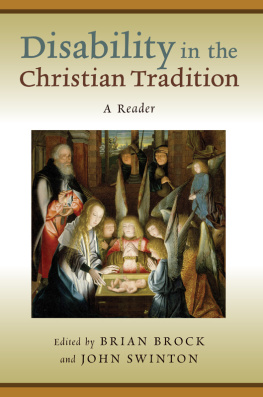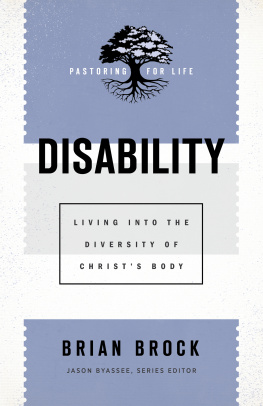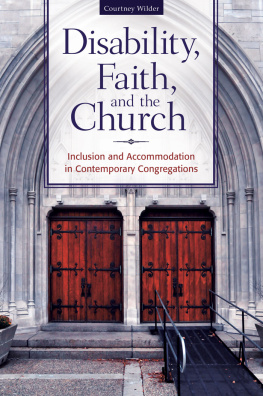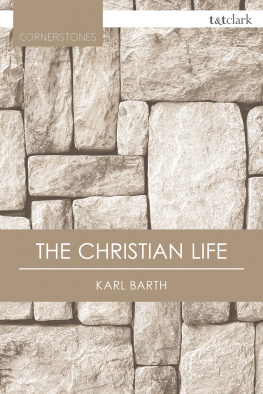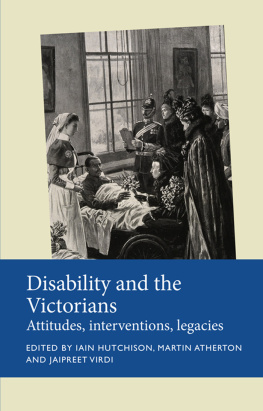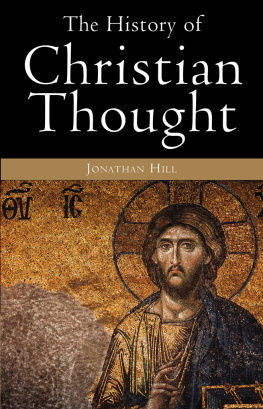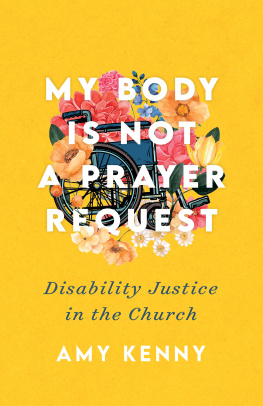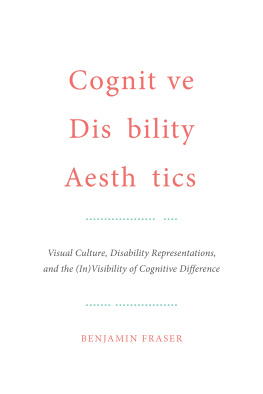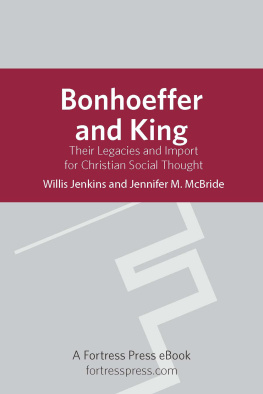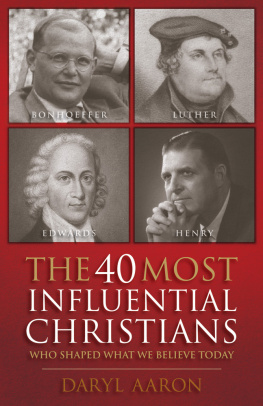DISABILITY IN THE CHRISTIAN TRADITION
Disability in the Christian Tradition
A READER
Edited by
Brian Brock & John Swinton
WILLIAM B. EERDMANS PUBLISHING COMPANY
GRAND RAPIDS, MICHIGAN / CAMBRIDGE, U.K.
2012 Wm. B. Eerdmans Publishing Company
All rights reserved
Published 2012 by
Wm. B. Eerdmans Publishing Co.
2140 Oak Industrial Drive N.E., Grand Rapids, Michigan 49505 /
P.O. Box 163, Cambridge CB3 9PU U.K.
17 16 15 14 13 12 7 6 5 4 3 2 1
Library of Congress Cataloging-in-Publication Data
Disability in the Christian tradition: a reader / edited by Brian Brock & John Swinton.
p. cm.
Includes bibliographical references and index.
ISBN 978-0-8028-6602-8 (pbk.: alk. paper)
ISBN 978-1-4674-3583-3 (epub)
1. People with disabilities Religious aspects Christianity.
2. Theological anthropology Christianity
I. Brock, Brian, 1970- II. Swinton, John, 1957
BT732.7.D57 2012
261.8'324 dc23
2012018109
www.eerdmans.com
With gratitude to Adam,
and our many other teachers
Contents
Brian Brock
Almut Caspary
Brian Brock
Miguel J. Romero
Amy Laura Hall
Stefan Heuser
Deborah Beth Creamer
Martin Wendte
Christopher Craig Brittain
Marjolein de Mooij
Bernd Wannenwetsch
Donald Wood
Jana Bennett
Hans S. Reinders
John Swinton
JANA BENNETT is Assistant Professor of Religious Studies at the University of Dayton in Dayton, Ohio. She is the author of Being Stuck between Stanley and the Feminists (the Proverbial Rock and a Hard Place), in Unsettling Arguments: A Festschrift on the Occasion of Stanley Hauerwass 70th Birthday (Eugene, Ore.: Cascade Press, 2010); and Water Is Thicker than Blood: An Augustinian Theology of Marriage and Singleness (New York: Oxford University Press, 2008).
CHRISTOPHER CRAIG BRITTAIN is Lecturer in Practical Theology at the University of Aberdeen and the author of Adorno and Theology (London: T&T Clark, 2010); and Religion at Ground Zero: Theological Responses to Times of Crisis (London and New York: Continuum, 2011).
BRIAN BROCK is Lecturer in Moral and Practical Theology at the University of Aberdeen. He is the author of Autism, Care, and Christian Hope in The Journal of Religion, Disability and Health 13, no. 1 (2009): 7-28; as well as the author and editor (with John Swinton) of Theology, Disability, and the New Genetics: Why Science Needs the Church (London: T&T Clark, 2007).
ALMUT CASPARY works in science management at a traditional medical research campus in the northeast of Berlin. She is the author of In Good Health: Philosophical-Theological Analysis of the Concept of Health in Contemporary Medical Ethics (Stuttgart: Franz Steiner, 2010); and co-author of a strategy proposal on religion and anti-discrimination practices in the NHS.
DEBORAH BETH CREAMER is Associate Dean for Academic Affairs, Associate Professor of Theological Bibliography, and Director of Library and Information Services at Iliff School of Theology. She is the author of Disability and Christian Theology: Embodied Limits and Constructive Possibilities (Oxford: Oxford University Press, 2009).
AMY LAURA HALL is Associate Professor of Christian Ethics at Duke University Divinity School. She is the author of Kierkegaard and the Treachery of Love (Cambridge: Cambridge University Press, 2002); and Conceiving Parenthood: American Protestantism and the Spirit of Reproduction (Grand Rapids: Wm. B. Eerdmans, 2007).
STEFAN HEUSER is Lecturer at the Chair of Ethics in the Institute for Systematic Theology at the University of Erlangen (Germany), and Vicar in the Evangelical Church of Hessen and Nassau. He is the author of Dialogue between Science and Ethics: Phenomenological Considerations on Interdisciplinary Research into Scientific Discourses, in Medicine at the Interface between Science and Ethics, edited by Walter Doerfler (Halle: Saale, 2010), pp. 177-90; and editor, with Ralf K. Wstenberg and Esther Hornung, of Bonhoeffer and the Biosciences: An Initial Exploration (Frankfurt/Main: Peter Lang, 2010).
MARJOLEIN DE MOOIJ is a Ph.D. student in the Faculty of Theology at the VU, Amsterdam, and Minister of Pastoral Care in a mental health institution.
HANS S. REINDERS is Professor of Ethics at the VU University, Amsterdam. He is the author of The Future of the Disabled in Liberal Society (South Bend: University of Notre Dame Press, 2000) and Receiving the Gift of Friendship (Grand Rapids: Wm B. Eerdmans, 2008); and the editor of The Paradox of Disability: Responses to Jean Vanier and LArche Communities from Theology and the Sciences (Grand Rapids: Wm. B. Eerdmans 2010).
MIGUEL J. ROMERO is a Th.D. candidate in moral theology at Duke Divinity School. His research concerns Aquinas on misericordia, and the moral witness of Christian communities willing to recognize and pursue the beauty of friendship with profoundly vulnerable and dependent persons. He is the author of Liberation, Development, and Human Advancement: Catholic Social Doctrine in Caritas in Veritate in Nova et Vetera, English edition, vol. 8, no. 4 (2010): 923-57.
JOHN SWINTON is Professor of Practical Theology and Pastoral Care at the University of Aberdeen, where he is the director of the Universitys Centre for Spirituality, Health, and Disability. Significant publications include Raging with Compassion: Pastoral Responses to the Problem of Evil (Grand Rapids: Wm. B. Eerdmans, 2007); Living Gently in a Violent World: The Prophetic Witness of Weakness, with Stanley Hauerwas and Jean Vanier (Downers Grove, Ill.: InterVarsity Press, 2008); and Resurrecting the Person: Friendship and the Care of People with Mental Health Problems (Nashville: Abingdon Press, 2000).
BERND WANNENWETSCH is Professor of Christian Ethics at the University of Aberdeen, and the author of Angels with Clipped Wings: The Disabled as the Key to the Recognition of Personhood, in Theology, Disability, and the New Genetics: Why Science Needs the Church, edited by John Swinton and Brian Brock (London: T&T Clark, 2007), pp. 182-200; and Political Worship: Ethics for Christian Citizens (Oxford: Oxford University Press, 2004).
MARTIN WENDTE was Assistant Professor at the Department of Theology at the Eberhard Karls University, Tbingen, and is now curate in Wrttemberg, Germany. He is the author of Gottmenschliche Einheit bei Hegel: Eine logische und theologische Untersuchung (Berlin/New York: de Gruyter, 2007); and co-editor of Hauptwerke der Systematischen Theologie: Ein Studienbuch (Tbingen: UTB, 2009).
DONALD WOOD is Lecturer in Systematic Theology at the University of Aberdeen. He is the author of Barths Theology of Interpretation (Aldershot: Ashgate, 2007).
INTRODUCTION:
Disability and the Quest for the Human
BRIAN BROCK
What does it mean to be human? Any approach to the topic of disability leads inexorably toward the problem of the human. Westerners face this problem, however, in an intellectual universe that has kept its distance from sustained attention to what we now call disabling conditions. In discussions about what it means to be human, disability has most often appeared in the modern period under the heading of special cases, outlying exceptions useful mainly for demarcating the outer boundaries of anthropological definitions. The images of the human constructed in this manner are aptly called best-case anthropologies. But understanding all humanity through the lens of a best-case anthropology has the awkward effect of rendering disability largely invisible. Like gender, race, and culture, disability is a topic that one takes to be either a reality that impacts us all in some way, or an issue that is really only a pressing issue for a specific subgroup of our peers. The latter view is widespread today and almost always accompanied by the self-assured geniality with which people assume that upon meeting someone in one of these subgroups, his or her needs would of course be accommodated. What is true of Western society in general is also largely true of the church. The times that I have asked ministers and pastors about members of their congregations who are disabled, writes the Dutch theologian Hans Reinders, the most frequent response is We dont have them (Reinders 2008, 335).

